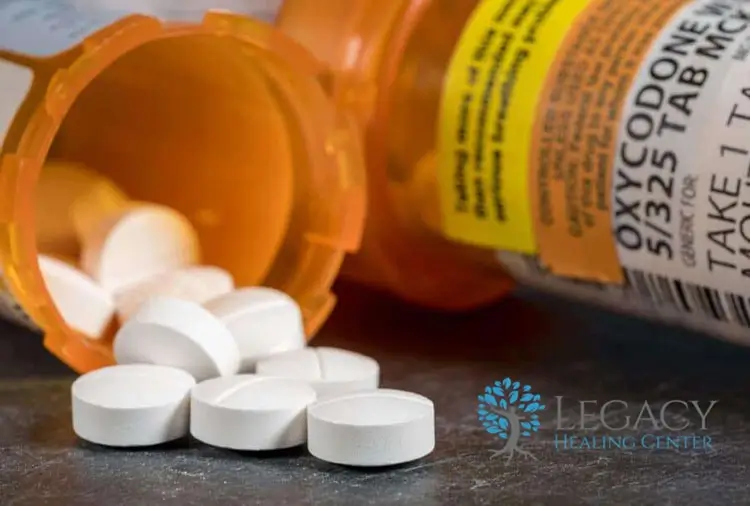
The Hidden Risk Behind Pain Relief
Oxycodone—found in medications like OxyContin® and Percocet®—is prescribed to ease suffering, yet for many, it becomes a source of distress. Behind its promise of relief lies a powerful opioid that can quietly lead to dependence, emotional numbing, and cycles of withdrawal. At Legacy Healing Center, we help individuals reclaim their lives with tailored, evidence-based care that addresses both the physical and psychological hold of oxycodone.
What Is Oxycodone?
Oxycodone is a semi-synthetic opioid analgesic, classified by the DEA as a Schedule II controlled substance due to its high potential for misuse and dependence. It works by binding to mu-opioid receptors in the brain and spinal cord, blocking pain signals and releasing a surge of dopamine that can create a powerful sense of euphoria.
While originally intended to manage post-surgical or cancer-related pain, oxycodone is now widely prescribed in both immediate- and extended-release forms. Misusing these formulations, by crushing, snorting, or injecting, rapidly delivers the full dose, increasing the risk of overdose. As tolerance builds, some individuals escalate their use or turn to illicit opioids like heroin or fentanyl when prescriptions become unavailable.
Recognizing Oxycodone Use Disorder and Addiction
A person who compulsively seeks or uses oxycodone despite harm may be experiencing Oxycodone Use Disorder (OUD). Warning signs include taking larger doses than prescribed, doctor-shopping, strong cravings, and withdrawal symptoms when the drug wears off.
Other red flags include mood swings, drowsiness, pinpoint pupils, chronic constipation, isolating from loved ones, missing work or school, and spending excessive time obtaining or recovering from the drug. Sadly, people with OUD often hide their use, making early detection by family members and healthcare providers critical.
What Makes Oxycodone Addictive?
Oxycodone powerfully activates the brain’s reward circuitry, and repeated exposure rewires that circuitry, driving compulsive use. Both biology and psychology determine how quickly someone transitions from prescribed use to addiction.
Biological Factors
When oxycodone binds to mu-opioid receptors in the ventral tegmental area (VTA), a flood of dopamine is released into the nucleus accumbens, reinforcing drug-taking behavior. Animal studies show VTA glutamate-to-dopamine pathways become hyper-responsive after oxycodone self-administration, amplifying cravings.
Genetics also matter: large-scale genome-wide analyses have identified shared variants that raise vulnerability to opioid and other substance use disorders.
Psychological Factors
Co-occurring mental health conditions such as depression, anxiety, PTSD, and trauma history heighten the appeal of oxycodone’s transient emotional relief. Environmental stressors, peer substance use, and lack of social support further fuel misuse. Over time, conditioned cues – the sight of pills, a certain room, or stress itself – can trigger powerful cravings even after prolonged abstinence.
How Does Oxycodone Affect the Brain?
In the short term, oxycodone dampens pain but also slows breathing and impairs judgment. With chronic exposure, the drug alters neural circuits involved in reward, motivation, memory, and stress, making it difficult to feel pleasure from everyday activities.
Short- & Long-Term Effects on the Brain
- Short-term: euphoria, sedation, confusion, slowed reaction time, and respiratory depression.
- Long-term: reduced gray-matter volume in reward centers, impaired decision-making, heightened stress reactivity, mood disorders, and a lasting decrease in natural dopamine responsiveness, which fuels anhedonia (the inability to feel pleasure).
How Does Oxycodone Affect the Body?
Beyond the brain, oxycodone influences nearly every organ system. Acute use can cause nausea and constipation, while chronic misuse damages the gastrointestinal tract, immune system, and cardiovascular health.
Short- & Long-Term Effects on the Body
- Short-term: constipation, dry mouth, itching, low blood pressure, slowed gastrointestinal motility.
- Long-term: hormonal dysregulation (e.g., decreased testosterone or estrogen), chronic constipation leading to bowel obstruction, heightened infection risk, sleep-disordered breathing, and cardiomyopathy. nida.nih.gov
Overdose Risk
Oxycodone suppresses the brainstem’s respiratory center; an excessive dose may cause breathing to slow or stop entirely. In 2022, opioids contributed to roughly 82,000 U.S. overdose deaths – about 76 percent of all drug fatalities.
Risk escalates when oxycodone is combined with alcohol, benzodiazepines, or other central nervous system depressants, or when users switch to illicitly manufactured pills of unknown strength. Carrying naloxone (Narcan®) and knowing the signs of overdose – shallow breathing, blue lips, unresponsiveness – can save lives.
Oxycodone Withdrawal Symptoms
When oxycodone use stops abruptly, the body rebounces in the opposite direction of the drug’s effects. Withdrawal is rarely life-threatening but can be intensely uncomfortable, often driving relapse without medical help.
Within 6-12 hours of the last dose, individuals may feel muscle and bone pain, yawning, sweating, tearing eyes, and goose-flesh (“cold turkey”). Peak symptoms (24-72 hours) include abdominal cramping, diarrhea, nausea, vomiting, elevated heart rate, and severe anxiety. Insomnia, depression, and drug cravings can persist for weeks, underscoring the importance of professional detox and long-term support.
Treatment Programs for Oxycodone Addiction
Legacy Healing Center offers a full continuum of evidence-based care tailored to Oxycodone Use Disorder:
- Medical Detox – ASAM-certified physicians manage withdrawal with 24/7 nursing, comfort medications, and, when appropriate, opioid-agonist tapers.
- Medication-Assisted Treatment (MAT) – FDA-approved medications such as buprenorphine-naloxone (Suboxone®), methadone, or extended-release naltrexone reduce cravings and relapse risk when paired with counseling.
- Residential & Partial Hospitalization Programs – Intensive daily therapy (CBT, DBT, EMDR), relapse-prevention workshops, and peer support groups in a safe, recovery-oriented community.
- Dual-Diagnosis Care – Integrated psychiatric services for co-occurring disorders (depression, anxiety, PTSD) ensure both conditions are addressed simultaneously.
- Family Systems Therapy & Weekend Workshops – Education and counseling help loved ones understand addiction, set healthy boundaries, and become allies in recovery.
- Holistic & Spiritual Services – Yoga, mindfulness, fitness training, nutrition counseling, and optional faith-based tracks heal mind, body, and spirit.
- Aftercare & Alumni Services – Individualized discharge planning, outpatient therapy, virtual support groups, and sober-living referrals promote sustained recovery nationwide.
Because no two recovery journeys are identical, Legacy Healing Center clinicians design personalized care plans rooted in client-directed, outcome-informed practice. Our multidisciplinary team collaborates with each patient to set goals, measure progress, and adjust interventions, ensuring the best chance at long-term sobriety.
Taking the Next Step
Oxycodone addiction is formidable, but with compassionate, science-driven treatment, recovery is achievable. If you or someone you love is ready to break free from oxycodone, call Legacy Healing Center today. Our admissions specialists are available 24/7 to answer questions, verify insurance, and arrange same-day placement at one of our accredited facilities.
Healing starts with a single, courageous decision. Reach out, and let’s build your legacy of recovery together.
Immediate Help and Support
Whether you’re ready to begin now or still exploring your path, these confidential resources are here for you:
- Legacy Healing Center: Call (888) 534-2295 to speak privately with an oxycodone treatment specialist.
- SAMHSA National Helpline: 1-800-662-HELP (4357) – Free, confidential support 24/7 for individuals and families affected by substance use.
- 988 Suicide & Crisis Lifeline: Dial 988 for immediate support in a mental health or substance-related emergency.
You are not alone. Support, healing, and hope are just one step away.


 Written By:
Written By: Edited By:
Edited By: Clinically Reviewed By:
Clinically Reviewed By: 




 Verify Insurance
Verify Insurance